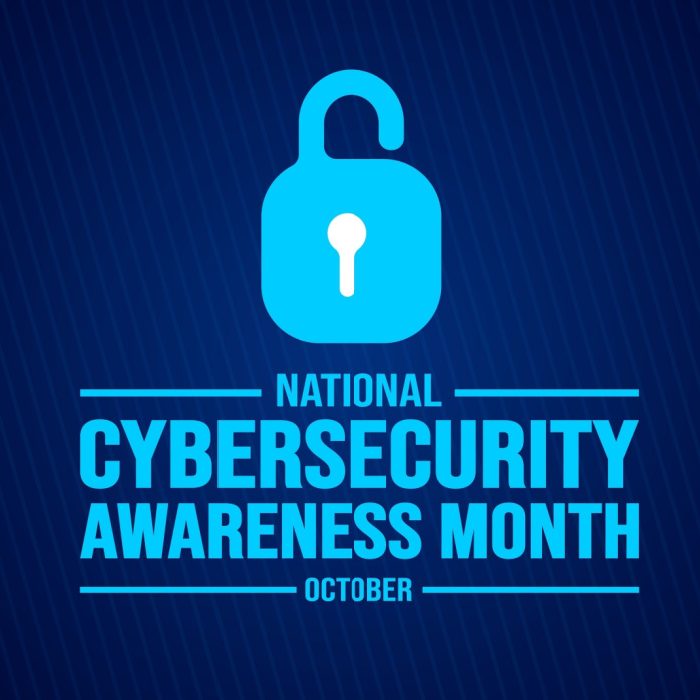
Safeguarding Your Business: Cybersecurity Awareness Month & Importance of Cyber-Insurance Policies
When playing the guitar, the hardest part (and most important part) is changing between chords.
If you don’t learn how to do this well and do it seamlessly, playing guitar well is going to be tough.
Same goes for the cybersecurity inside your business. If you don’t have your network and environment properly implemented, you’re going to be ripe for the picking of a cybersecurity incident.
October is National Cybersecurity Awareness Month and is a stark reminder of the need to protect yourself and your business from the ever-present cyber threats that loom in the digital shadows.
October serves as a beacon, guiding us towards a safer and more secure online future.
As businesses use more and more technology, they open themselves to a host of potential vulnerabilities like data breaches and ransomware attacks. The consequences are devastating, from financial loss, damage to brand reputation, and loss of revenue as well as staff turnover.
National Cybersecurity Awareness month encourages businesses to be proactive rather than reactive. We want to foster a culture of preparedness and resilience.
Why Cyber-Liability Insurance
One essential component of a robust cybersecurity strategy for businesses is having a cyber-liability insurance policy.
These policies provide a safety net in the event of a cyber incident, helping you recover and mitigate financial and operational damage.
But why are these policies crucial? How do they fit into the broader picture of cybersecurity awareness? And where does the cloud fit into this equation?
First, cyber-liability policies offer peace of mind.
It’s not a matter of “if” but “when” a cyber incident will occur inside your business. Knowing that you have insurance coverage can alleviate the anxiety associated with this inevitability. It allows you to focus on growth and innovation without constantly worrying about the potential financial fallout of a cyberattack.
Second, these policies can be a lifeline when disaster strikes.
In the aftermath of an incident, the costs can quickly escalate. Cyber-insurance covers expenses related to data recovery, legal fees, customer notifications, and even public relations (PR) efforts to repair your business and your brand. Without such coverage, these costs could cripple your business, especially smaller ones with limited resources.
Third, you must understand that even the best security measures can’t guarantee absolute protection.
Cybercriminals are experts at exploiting vulnerabilities. Anyone can fall victim. It’s not a matter of incompetence, it’s a matter of the evolving threats. Cyber-insurance liability policies are not a sign of distrust but rather a responsible step towards protecting your business and by extension, those who rely on it.
Here are four requirements or controls you must have in place to obtain cyber-liability insurance, as well as keep your data backed up to the best cloud environment.
You must have multi-factor authentication
Multi-factor authentication (MFA) protects sensitive data by requiring your users to verify their identity using multiple factors. Common forms of MFA require users to provide passwords, fingerprints, or other biometric identifiers. By requiring MFA, businesses ensure that only authorized individuals can access sensitive data. If you don’t have this properly implemented, you may not get your payout from your insurance provider so be sure to validate and test your MFA and backup process to ensure insurance compliance.
Security awareness training and testing
To qualify for cyber-liability insurance, businesses must undergo security awareness training and testing. This ensures employees are current on security threats and procedures and will reduce your risk of becoming a victim of a cyber-attack. By conducting regular testing, you’re instilling a baseline level of vigilance in your team towards suspicious emails because no one wants to fail a test phishing email and be enrolled in more training. You also need to be testing your backup and disaster recovery process to ensure that when it does happen, your data is safe, secure, and accessible.
Separate backups and the cloud
Many IT professionals believe a single data backup is enough to protect you from potential cyberattacks. This just isn’t the case. To be fully protected, you need a process that’s focused on backups that are safe and secure in the best cloud environment for your business. Here at Decision Digital, we follow a process to back up your data using the NIST framework because it thwarts potential threats with multiple layers of top-level security practices. Cybersecurity insurance will imminently become the norm for all businesses and it’s essential you understand and have the resources needed so your claims do not get denied. It’s our job to identify, protect, and detect your data with a cloud and backup solution that gives you peace of mind and also meets your cyber-liability insurance needs.
Managing your vulnerabilities
Vulnerability management is where we use tools that detect, classify, repair, and mitigate exposures through a continuous process. It never stops. The reason this continuous process is important is because vulnerabilities allow cyber-criminals to exploit unauthorized access to sensitive data, applications, and systems. By managing your network and monitoring your infrastructure, it helps businesses identify vulnerabilities before attackers can exploit them.
Remember, cybersecurity isn’t just about protecting data. It’s about protecting the livelihoods and trust of those who depend on your business.
We care about doing things the right way. We want to walk this cybersecurity and technology journey with you for a better way to build your business with tech.
Contact Decision Digital today to learn more about how we can help you implement your security and backup needs.